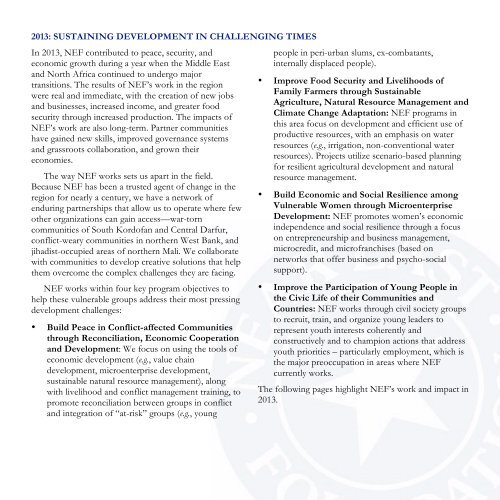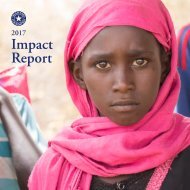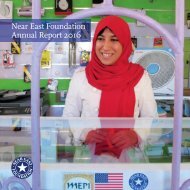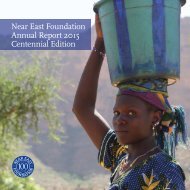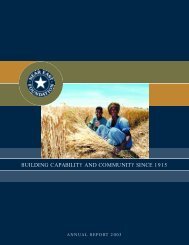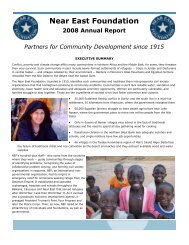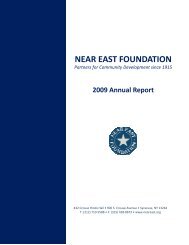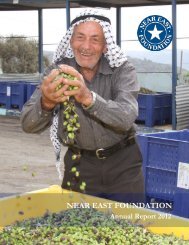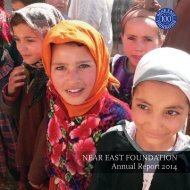Near East Foundation 2013 Annual Report
- No tags were found...
Create successful ePaper yourself
Turn your PDF publications into a flip-book with our unique Google optimized e-Paper software.
<strong>2013</strong>: SUSTAINING DEVELOPMENT IN CHALLENGING TIMES<br />
In <strong>2013</strong>, NEF contributed to peace, security, and<br />
economic growth during a year when the Middle <strong>East</strong><br />
and North Africa continued to undergo major<br />
transitions. The results of NEF’s work in the region<br />
were real and immediate, with the creation of new jobs<br />
and businesses, increased income, and greater food<br />
security through increased production. The impacts of<br />
NEF’s work are also long-term. Partner communities<br />
have gained new skills, improved governance systems<br />
and grassroots collaboration, and grown their<br />
economies.<br />
The way NEF works sets us apart in the field.<br />
Because NEF has been a trusted agent of change in the<br />
region for nearly a century, we have a network of<br />
enduring partnerships that allow us to operate where few<br />
other organizations can gain access—war-torn<br />
communities of South Kordofan and Central Darfur,<br />
conflict-weary communities in northern West Bank, and<br />
jihadist-occupied areas of northern Mali. We collaborate<br />
with communities to develop creative solutions that help<br />
them overcome the complex challenges they are facing.<br />
NEF works within four key program objectives to<br />
help these vulnerable groups address their most pressing<br />
development challenges:<br />
• Build Peace in Conflict-affected Communities<br />
through Reconciliation, Economic Cooperation<br />
and Development: We focus on using the tools of<br />
economic development (e.g., value chain<br />
development, microenterprise development,<br />
sustainable natural resource management), along<br />
with livelihood and conflict management training, to<br />
promote reconciliation between groups in conflict<br />
and integration of “at-risk” groups (e.g., young<br />
people in peri-urban slums, ex-combatants,<br />
internally displaced people).<br />
• Improve Food Security and Livelihoods of<br />
Family Farmers through Sustainable<br />
Agriculture, Natural Resource Management and<br />
Climate Change Adaptation: NEF programs in<br />
this area focus on development and efficient use of<br />
productive resources, with an emphasis on water<br />
resources (e.g., irrigation, non-conventional water<br />
resources). Projects utilize scenario-based planning<br />
for resilient agricultural development and natural<br />
resource management.<br />
• Build Economic and Social Resilience among<br />
Vulnerable Women through Microenterprise<br />
Development: NEF promotes women’s economic<br />
independence and social resilience through a focus<br />
on entrepreneurship and business management,<br />
microcredit, and microfranchises (based on<br />
networks that offer business and psycho-social<br />
support).<br />
• Improve the Participation of Young People in<br />
the Civic Life of their Communities and<br />
Countries: NEF works through civil society groups<br />
to recruit, train, and organize young leaders to<br />
represent youth interests coherently and<br />
constructively and to champion actions that address<br />
youth priorities – particularly employment, which is<br />
the major preoccupation in areas where NEF<br />
currently works.<br />
The following pages highlight NEF’s work and impact in<br />
<strong>2013</strong>.


